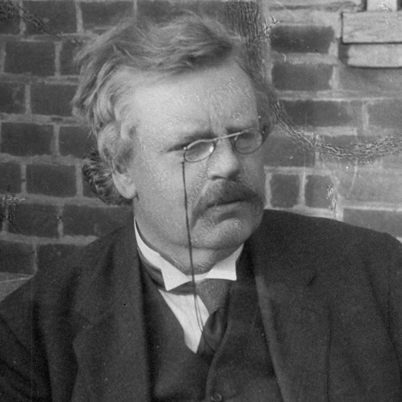At its heart, the pursuit of happiness is moral, not hedonistic. The pursuit of happiness is fulfilled in freedom – the opportunity to do good, not in license – the right to do wrong. The pursuit of happiness is found by living within the moral universe, not in seeking to live outside the moral universe.
 The eminent English writer, poet, philosopher/theologian and mentor of J.R.R. Tolkien and C.S. Lewis, G.K. Chesterton, wrote in his biography of Francis of Assisi, that Francis lived in a pagan environment. Chesterton described the Europeans of his own day as nature worshippers, people who “simply … follow [their] nose.” [emphasis added]
The eminent English writer, poet, philosopher/theologian and mentor of J.R.R. Tolkien and C.S. Lewis, G.K. Chesterton, wrote in his biography of Francis of Assisi, that Francis lived in a pagan environment. Chesterton described the Europeans of his own day as nature worshippers, people who “simply … follow [their] nose.” [emphasis added]
When I read Francis of Assisi biography, this phrase struck me as an apt description, not only of ancient pagans, but of modern and postmodern pagans as well. Both moderns and postmoderns, in their rejection of God, have rejected the moral order.
What is left is simply to follow one’s nose! I would argue that this is why moderns and postmoderns have rejected God: they want license to follow their nose.
Chesterton continues, that when the Greeks began to follow their noses––that is, to be natural–they began to do the most unnatural things.
No sooner did the Greeks themselves begin to follow their own noses and their own notion of being natural, than the queerest thing in history seems to have happened to them … The wisest men in the world set out to be natural; and the most unnatural thing in the world was the very first thing they did.
Chesterton observes that it was not simply the pagan Greeks, but also the “nature worshiping” Romans who followed their noses as well. “In the Roman Empire also, long before the end, we find nature-worship inevitably producing things that are against nature.”
Happiness is lost when sex becomes a tyrant
This is the Apostle Paul’s argument in Romans 1:24-27. As human beings reject God to follow their noses, they move deeply into an “unnatural” sexuality as attested by our design and natural function. Pagan worship invariably leads to pagan sexuality. Women exchanged the natural proclivity towards men for sex with other women. Men made the same exchange.
Therefore God gave them over in the sinful desires of their hearts to sexual impurity for the degrading of their bodies with one another. They exchanged the truth about God for a lie, and worshiped and served created things rather than the Creator-who is forever praised. Amen. Because of this, God gave them over to shameful lusts. Even their women exchanged natural sexual relations for unnatural ones. In the same way the men also abandoned natural relations with women and were inflamed with lust for one another. Men committed shameful acts with other men, and received in themselves the due penalty for their error. [emphasis added]
The attempted overthrow of God carried consequences, including the overthrow of the moral, natural universe. What happened in pre-Christian, pagan Europe was pagan sexuality. The human imagination was unrestrained by any moral consideration. Sex could be practiced between men, between women, with boys, with objects, with animals.
Chesterton described this:
What had happened to the human imagination, as a whole, was that the whole world was coloured by dangerous and rapidly deteriorating passions; by natural passions becoming unnatural passions. Thus the effect of treating sex as only one innocent natural thing was that every other innocent natural thing became soaked and sodden with sex. For sex cannot be admitted to a mere equality among elementary emotions or experiences like eating and sleeping. The moment sex ceases to be a servant it becomes a tyrant.
Happiness and pleasure are not the same thing
The Creator gave us not only a natural universe, but a moral order as well. When sex stayed within its God-intended design, it was a beautiful, life-producing, whole-life intimacy. When it moved beyond that design into unconstrained imagination, it was reduced to “plumbing,” mere biology. Ultimately, in our postmodern world, it became mere imagination. Sex outside the moral order became a tyrant. Now pagan sexuality is unleashed again in the modern and postmodern worlds, and we are, again, reaping the whirlwind. Sex has become a god that has enslaved us.
The pursuit of happiness is not the pursuit of pleasure. The pursuit of pleasure is hedonism, and hedonists are not happy because the intensity and amount of pleasure must constantly be increased in order to feel happy. For the hedonist, pleasure is a drug.
In our series on Romans 1 we witnessed that when people turned their back on God, to invoke Chesterton once again, they did not believe in nothing, they believed in anything. Pagan worship led invariably to pagan sexuality.
Before the Jews and the Christians, pagan sexuality was normal. It was the Judeo-Christian concept of sexuality that was deviant. It deviated from the pagan concept of following one’s nose. It tamed men’s passions and brought sexuality into the glorious circle of covenantal marriage between a man and a woman.
Happiness is found when its pursuit is in a moral, not a hedonistic, framework.
– Darrow Miller






